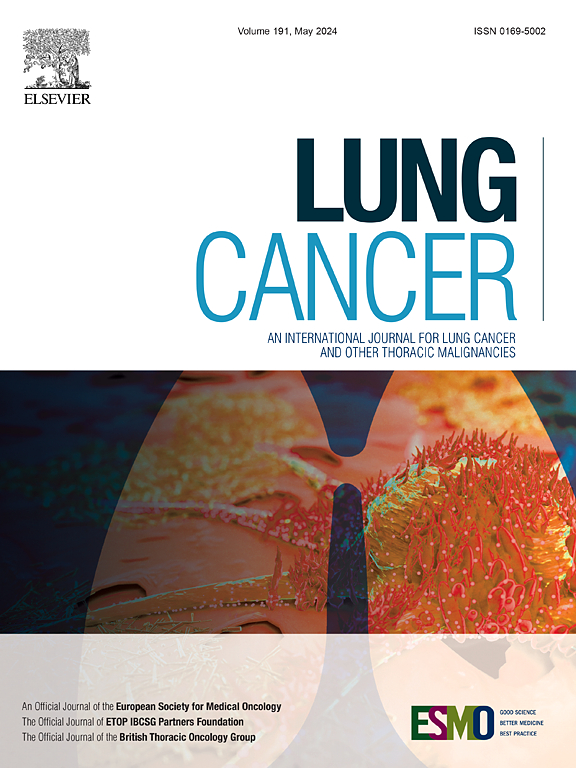Durvalumab plus irinotecan + cisplatin for untreated extensive-stage small cell lung cancer: REBORN, phase II study (WJOG13520L)
IF 4.4
2区 医学
Q1 ONCOLOGY
引用次数: 0
Abstract
Introduction
PD-L1 inhibitors combined etoposide-platinum (EP) are standard first-line treatments for extensive-stage small-cell lung cancer (ES-SCLC). However, their efficacy remains suboptimal. Irinotecan-cisplatin (IP) is optional regimen for ES-SCLC, and irinotecan has shown potential immunostimulatory activity. This study evaluated the efficacy and safety of IP plus durvalumab in untreated ES-SCLC.
Methods
Eligible patients (aged 20–74 years; PS 0–1 received four cycles of IP (irinotecan 60 mg/m2, days 1,8,15 and cisplatin 60 mg/m2, day 1) with durvalumab 1500 mg, followed by durvalumab 1500 mg every 4 weeks. Primary endpoint was the 12-month progression-free survival (PFS) rate, assessed by an independent central review (ICR).
Results
Between May 2021 and Nov 2022, 42 patients (median age, 66 years; 76.2 % were male; 31.0 % had PS 0) were enrolled. The 12-month PFS rate by ICR was 18.8 % (90 % CI, 9.3–30.8 %), with a median PFS of 5.7 months (95 % CI, 4.9–7.6 months). Median overall survival (OS) was 16.9 months (95 % CI, 11.8–NE), and the 12-month OS rate was 65.8 % (95 % CI, 49.1–78.1). Confirmed overall response rate (ORR) was 65.9 %, and disease control rate (DCR) was 85.4 %. Grade ≥3 adverse events (AEs) occurred in 73.8 %, including two grade 5 (2.4 %; pneumonitis and hepatitis). Pneumonitis occurred in 4.8 % (grade 1 and 5), while diarrhea of grade 3 or more occurred in 7.1 % patients.
Conclusion
The REBORN study did not demonstrate the expected efficacy of IP plus durvalumab in untreated ES-SCLC, with its efficacy and safety generally comparable to those of EP plus durvalumab.
Durvalumab +伊立替康+顺铂治疗未经治疗的广泛期小细胞肺癌:REBORN, II期研究(WJOG13520L)
pd - l1抑制剂联合依托泊肽-铂(EP)是广泛期小细胞肺癌(ES-SCLC)的标准一线治疗方法。然而,它们的功效仍然不够理想。伊立替康-顺铂(IP)是ES-SCLC的可选方案,伊立替康显示出潜在的免疫刺激活性。本研究评估了IP联合杜伐单抗治疗未治疗ES-SCLC的疗效和安全性。方法入选患者年龄20 ~ 74岁;PS 0-1接受4个周期的IP治疗(伊立替康60mg /m2,第1、8、15天,顺铂60mg /m2,第1天),durvalumab 1500 mg,随后每4周使用durvalumab 1500 mg。主要终点是12个月无进展生存(PFS)率,由独立中心审查(ICR)评估。结果在2021年5月至2022年11月期间,42例患者(中位年龄66岁;76.2%为男性;31.1%的患者PS为0)。ICR的12个月PFS率为18.8% (90% CI, 9.3 - 30.8%),中位PFS为5.7个月(95% CI, 4.9-7.6个月)。中位总生存期(OS)为16.9个月(95% CI, 11.8-NE), 12个月OS率为65.8% (95% CI, 49.1-78.1)。确诊总有效率(ORR)为65.9%,疾病控制率(DCR)为85.4%。发生≥3级不良事件(ae)的比例为73.8%,包括2例5级不良事件(2.4%;肺炎和肝炎)。肺炎发生率为4.8%(1级和5级),而腹泻发生率为7.1%(3级或以上)。REBORN研究并未证明IP + durvalumab治疗未治疗ES-SCLC的预期疗效,其疗效和安全性与EP + durvalumab大致相当。
本文章由计算机程序翻译,如有差异,请以英文原文为准。
求助全文
约1分钟内获得全文
求助全文
来源期刊

Lung Cancer
医学-呼吸系统
CiteScore
9.40
自引率
3.80%
发文量
407
审稿时长
25 days
期刊介绍:
Lung Cancer is an international publication covering the clinical, translational and basic science of malignancies of the lung and chest region.Original research articles, early reports, review articles, editorials and correspondence covering the prevention, epidemiology and etiology, basic biology, pathology, clinical assessment, surgery, chemotherapy, radiotherapy, combined treatment modalities, other treatment modalities and outcomes of lung cancer are welcome.
 求助内容:
求助内容: 应助结果提醒方式:
应助结果提醒方式:


